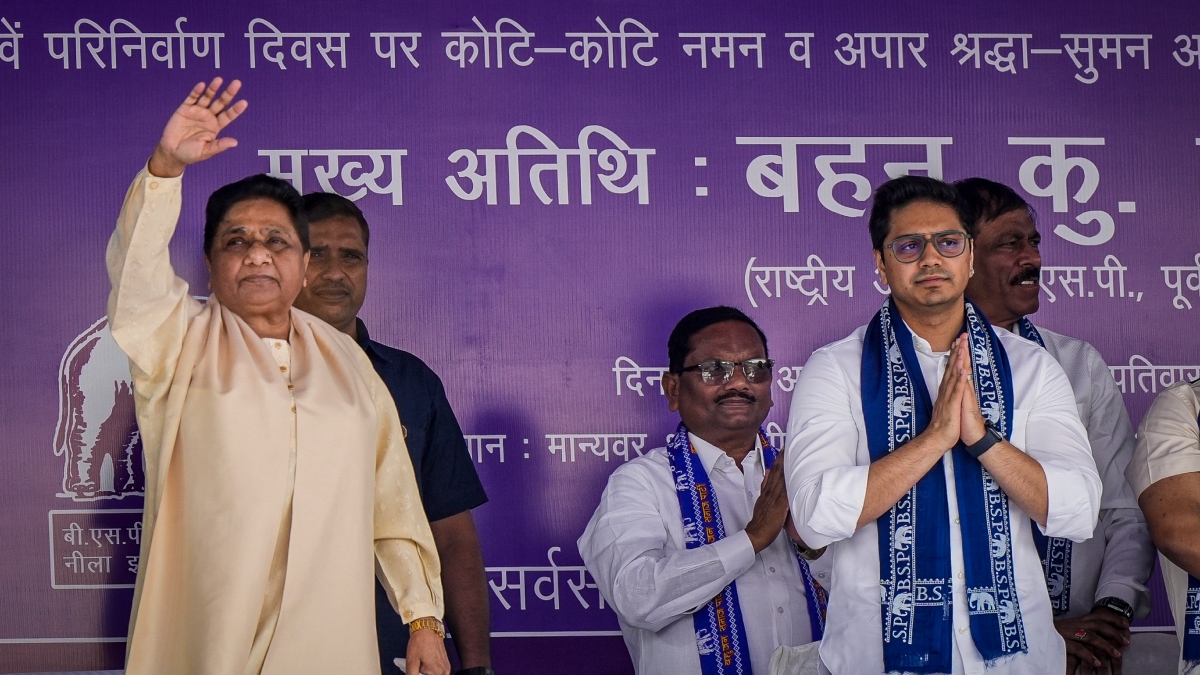Mayawati's BSP showing warmth towards BJP ahead of Biharassembly polls?
 Bahujan Samaj Party (BSP) Chief Mayawati with party National Convenor Akash Anand | PTI
Bahujan Samaj Party (BSP) Chief Mayawati with party National Convenor Akash Anand | PTI
The Bahujan Samaj Party (BSP) is once again preparing to test its electoral fortunes in Bihar, a state where its presence has long been marginal but symbolically significant. The party will contest all 243 seats, the only other party doing so besides Prashant Kishor’s Jan Suraaj, which is making its debut in this round of assembly polls.
Ahead of the Bihar elections, BSP supremo Mayawati’s rally in Lucknow on the occasion of party founder Kanshi Ram’s death anniversary was a massive show of strength. It was interpreted not only as an endorsement of her nephew Akash Anand as her heir, but also as a signal of her political messaging. While attacking the Samajwadi Party and the Congress, Mayawati showed unexpected warmth towards the ruling Bharatiya Janata Party (BJP) government. Her praise for Chief Minister Yogi Adityanath’s administration for maintaining Dalit memorials built during her tenure has reignited speculation about the BSP’s nuanced shift.
This apparent ‘softness’ towards the BJP coincides with a renewed attempt to expand the BSP’s footprint in Bihar. Mayawati has declared that her party will contest all seats in the state’s forthcoming assembly election. Akash Anand, who recently led the Sarvajan Hitay Jagran Yatra, will spearhead the campaign.
The BSP’s electoral record in Bihar tells a story of persistence amid decline. In the 2020 assembly elections, it contested 78 seats in alliance with Asaduddin Owaisi’s AIMIM and Upendra Kushwaha’s Rashtriya Lok Morcha, managing to win only one. Earlier, in 2015, it had gone solo on 228 seats and failed to open its account.
The BSP’s vote share has hovered between two and three per cent in the state, marginal yet higher than that of several other regional parties. This reflects its captive Dalit vote bank spread across constituencies, which often becomes the difference between the winner and the runner-up.
For the BSP, Bihar now represents both an opportunity and a test. The state’s diverse social base and multiple regional parties organised along caste lines offer openings for the BSP’s social engineering model. On the other hand, the vigour in the BSP’s campaign and any improvement in its performance is likely to impact other parties courting Dalit voters, particularly those in the Grand Alliance, such as the Congress and the RJD.
In Bihar, both the Congress and Jan Suraaj had appointed Dalit leaders as their state presidents, underscoring the growing competition for this voter base.
Mayawati’s attacks on the SP and Congress during the Lucknow rally were also aimed at preventing these parties from attracting Dalit voters who had begun drifting towards them as the BSP came to be seen as a non-serious contender.
As Bihar heads to the polls, the BSP’s challenge may not be reflected in the number of seats it wins, but in the vote share it manages to reclaim. Which parties will feel the impact most will become clear only after the results are out.
India